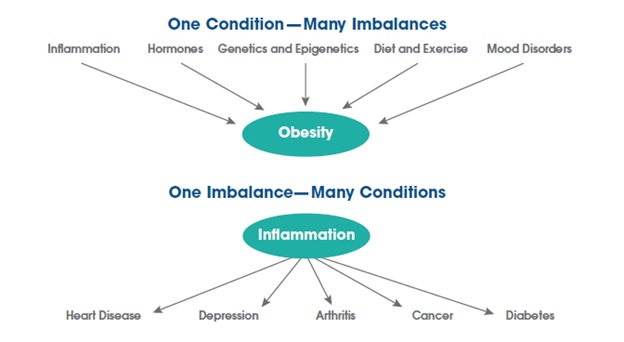
Functional Medicine asks how and why illness occurs and restores health by addressing the root causes of disease for each individual
Functional Medicine is a systems biology–based approach that focuses on identifying and addressing the root cause of disease. It is an approach to health care that conceptualizes health and illness as part of a continuum in which all components of the human biological system interact dynamically with the environment, producing patterns and effects that change over time. Chronic disease is almost always preceded by a period of declining function in one or more of the body’s systems. Restoring health requires reversing (or substantially improving) the specific dysfunctions that have contributed to the disease state. By changing the disease-centered focus of medical practice to a patient-centered approach, functional medicine addresses the whole person, not just an isolated set of symptoms. When a patient’s clinical history, signs, symptoms, and story are viewed through the functional medicine framework, the systems-view illuminates the root causes of illness and practitioners can support the healing process.
Each patient represents a unique, complex, and interwoven set of environmental and lifestyle influences on intrinsic functionality (their genetic vulnerabilities) that have set the stage for the development of disease or the maintenance of health. Functional Medicine asks how and why illness occurs and restores health by addressing the root causes of disease for each individual. Each symptom or differential diagnosis may be one of many contributing to an individual’s illness.

As the graphic illustrates, a diagnosis can be the result of more than one cause. For example, obesity can be caused by many different factors, including inflammation. Likewise, a cause such as inflammation may lead to a number of different diagnoses. The precise manifestation of each cause depends on the individual’s genes, environment, and lifestyle, and only treatments that address the right cause will have lasting benefit beyond symptom suppression.
By addressing root cause, rather than symptoms, practitioners become oriented to identifying the complexity of disease. As a result, Functional Medicine treatment targets the specific manifestations of disease in each individual. The Functional Medicine model is an individualized, patient centered, science-based approach that empowers patients and practitioners to work together to address the underlying causes of disease and promote optimal wellness. It requires a detailed understanding of each patient’s genetic, biochemical, and lifestyle factors and leverages that data to direct personalized treatment plans that lead to improved patient outcomes.
As diet and lifestyle often contribute to chronic diseases, a personalized approach to nutrition provided through therapeutic dietary interventions, is considered to be foundational. A food-first approach, with focused therapeutic interventions that address underlying physiological concerns, provides the foundational plan to be implemented by the practitioner.




